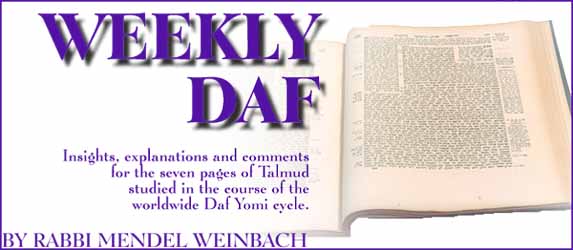Weekly Daf #57
Bava Basra 142 - 148 - Issue #57
6 - 12 Adar Sheini 5755 / 8 - 14 March 1995
This publication is also available in the following formats:
![]()
![]()
![]() Explanation of these symbols
Explanation of these symbols
What Did He Mean?
| The
Cases: | A man sends from abroad a shipment of fine clothing materials for his family with no instructions as to how they should be distributed. He has sons and daughters. | A man makes a deathbed wish that all his possessions be a gift to his children. He has a son and a daughter. | A man makes a deathbed wish that all his possessions be a gift to his sons. He has a son and a grandson. |
| The
Questions: | How do we divide up the shipment? | Did he mean only his son, whom he referred to in the plural, or does he intend to include his daughter as an equal recipient? | Did he mean to include his grandson in the bequest? |
| The
Solutions: (all based on our sages' reading of Human psychology) | Materials suitable for men's clothing go to the sons. Regarding materials suitable for women's garments, if he has unmarried daughters they are the recipients he had in mind. If both his sons and daughters are married, however, the materials for women's clothes were intended for his sons' wives to fulfill their responsibility to clothe their wives and not for his married daughters who have husbands to take care of their needs. | It is human nature to refer to one's son in the plural and we therefore assume that he was referring only to his son, who would be his sole heir in the event that he died without making any bequests. (Tosefos points out that the need for issuing such a deathbed direction is to nullify any will he might have earlier written to circumvent the inheritance procedure.) | Since we have already established that a man refers to his son in the plural it is more logical to assume that he meant only the son and not the grandson, whom it is not customary for one to refer to as a son. |
 Good Days, BAD
DAYS
Good Days, BAD
DAYS 
"All the days of the poor man," says King Solomon (Mishlei 15:15) "are bad ones."
How can they all be bad because of his lack of food, asks Rabbi Yehoshua Ben Levi, when there are Sabbaths and Festivals for which he is provided with charity funds to enjoy sumptuous meals?
The answer lies, he concludes, in the statement of that great Talmudic Sage and physician Shmuel who said:
"A sharp change in one's eating pattern (All week long he eats dry bread and on these festive days he eats meat. - Rashbam) is the beginning of digestive problems."
General Editor: Rabbi Moshe Newman
Production Design: Lev Seltzer
HTML Design: Eli Ballon, Michael Treblow
© 1995 Ohr Somayach International - All rights reserved. This publication may be distributed to another person intact without prior permission. We also encourage you to include this material in other publications, such as synagogue newsletters. However, we ask that you contact us beforehand for permission, and then send us a sample issue.
This publication is available via E-Mail
Ohr Somayach Institutions is an international network of Yeshivot and outreach centers, with branches in North America, Europe, South Africa and South America. The Central Campus in Jerusalem provides a full range of educational services for over 685 full-time students.
The Jewish Learning Exchange (JLE) of Ohr Somayach offers summer and winter programs in Israel that attract hundreds of university students from around the world for 3 to 8 weeks of study and touring.
Ohr Somayach's Web site is hosted by TeamGenesis
Dedication opportunities are available for Weekly Daf. Please contact us for details.







